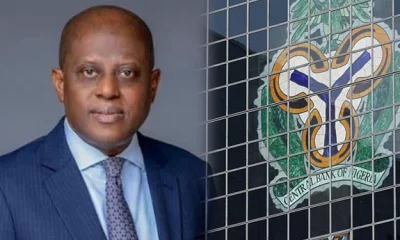The Central Bank of Nigeria (CBN) Governor, Godwin Emefiele, says the apex bank is exploring new techniques and policies to drive financial inclusion target in the country.
CBN Governor disclosed this while welcoming the President, Global Growth and Opportunities of the Bill and Melinda Gates Foundation, Mr Roger Vorhiles, during a courtesy visit to the Governor.
According to the World Bank, Financial inclusion means that individuals and businesses have access to useful and affordable financial products and services that meet their needs – transactions, payments, savings, credit and insurance – delivered in a responsible and sustainable way.
While speaking, Emefiele disclosed that he had recently mandated a shift in the adult financial inclusion target to 95%. According to him, the CBN had discovered new techniques and policies to drive financial inclusion.
Some of the strategies as listed by Emefiele include Licensing and Regulatory Guidelines for Payment Service Banks, the Shared Agent Network Expansion Facility and generally providing the conducive regulatory environment for Fintechs to contribute to financial inclusion.
While reacting to Emefiele’s disclosure, Mr Vorhiles in response mentioned that the Foundation was committed to supporting potential areas for further collaboration with the CBN and requested to be kept abreast of new developments on the horizon for financial inclusion in Nigeria.
Mr Vorhiles revealed that the Gates Foundation had initiated a fresh commitment in Africa that aims to close the financial inclusion gap in the continent.
Mr Vorhiles further explained that the gender gap initiative would be implemented through grants for projects that would particularly increase access to finance by women particularly in African countries including Nigeria.
As part of the commitment to further enhance the level of financial inclusion in Nigeria and inclusive economic growth, Emefiele who is also the Chairman of the National Financial Inclusion Steering Committee, in his 5-year strategy (2019—2024) has set a target of 95% financial inclusion rate by 2024.
According to the Governor, the new target calls for institutions to re-strategize and refocus initiatives, policies and schemes that will accelerate the pace of delivery of their respective financial inclusion efforts.
Basically, the revised National Financial Inclusion Strategy (NFIS 2.0) places implementation focus on women, rural areas, youth, Northern Nigeria and Micro Small and Medium Enterprises (MSMEs).
According to the CBN Governor, achieving the 2019 and 2020 Financial Inclusion Roadmap will leverage on posting of National Youth Service Corps members to branches of Deposit Money Banks, Microfinance Banks and Local Government areas. Each youth corps member would be expected to bring in 200 new accounts by the end of 2019 to reach the goal.
Meanwhile, Emefiele further noted that in order to address the challenge of financial product development and financial education, leveraging on digital platforms and proliferation of agent networks must be pursued.

 Health5 days ago
Health5 days ago
 Entertainment6 days ago
Entertainment6 days ago
 Crime5 days ago
Crime5 days ago
 Education7 days ago
Education7 days ago
 Health7 days ago
Health7 days ago
 Comments and Issues6 days ago
Comments and Issues6 days ago
 Football6 days ago
Football6 days ago
 Latest6 days ago
Latest6 days ago













